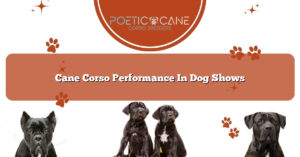Imagine having a loyal and powerful companion by your side, ready to protect you at all costs. Meet the Cane Corso, a breed that excels in protection sports and trials. With their natural instincts and rigorous training, these dogs are ready to showcase their skills and dedication.
In this article, we will dive into the fascinating world of Cane Corso in protection sports and trials, exploring their history, training methods, and impressive performance. Get ready to be amazed by their unwavering loyalty and unwavering courage.
Key Takeaways
- Cane Corso is a breed bred in Italy for protection work and guarding, known for their loyalty, intelligence, and bravery.
- They are trained and tested in disciplines like obedience, tracking, agility, and personal protection, and their athleticism, agility, and natural instincts contribute to their success in protection sports.
- Training for protection trials includes establishing a strong foundation in obedience and control, teaching basic commands using positive reinforcement, gradually introducing more advanced exercises under distractions, and exposing them to various scenarios to develop confidence and adaptability.
- Cane Corso’s natural protective instincts include inherent loyalty and a strong territorial drive, a deep sense of devotion to family, a strong desire to protect home and property, and being highly alert to potential intruders. These instincts can be channeled into protection sports and trials.
History of Cane Corso in Protection Sports
The history of the Cane Corso in protection sports dates back to the early 20th century when these powerful dogs were first utilized for their natural guarding instincts. Originally bred in Italy, the Cane Corso was specifically developed for protection work and to serve as a guardian.
These dogs were highly valued for their loyalty, intelligence, and bravery, making them ideal for various protection sports and trials. Over the years, the Cane Corso has been trained and tested in different disciplines such as obedience, tracking, agility, and personal protection.
Their athleticism, agility, and natural instincts have made them successful competitors in these sports. Today, the Cane Corso continues to excel in protection sports, showcasing their capabilities and proving their worth as reliable and formidable guardians.
Training Cane Corso for Protection Trials
To successfully train your Cane Corso for protection trials, start by establishing a strong foundation in obedience and control. These trials require your Cane Corso to showcase their protective instincts while maintaining discipline and responding to commands.
Begin by teaching basic obedience commands such as sit, stay, and come. Use positive reinforcement techniques, such as treats and praise, to encourage good behavior. Once your Cane Corso has mastered these commands, gradually introduce more advanced exercises, such as heelwork and recall under distractions.
It’s important to expose your dog to various scenarios, simulating real-life situations they may encounter during protection trials. This will help them develop confidence and adaptability.
Remember to always prioritize safety and consult with professional trainers who specialize in protection sports. With consistent training and guidance, your Cane Corso can excel in protection trials and showcase their natural protective instincts.
Cane Corso’s Natural Protective Instincts
To understand the Cane Corso’s natural protective instincts, you must recognize their inherent loyalty and strong territorial drive. These dogs have a deep sense of devotion to their family, and they’ll go to great lengths to protect them. Their loyalty is unwavering, and they’ll fearlessly defend their loved ones from any perceived threat.
The Cane Corso’s strong territorial drive also plays a significant role in their natural protective instincts. They have a strong desire to protect their home and property, and they’re highly alert to any potential intruders. This instinctive need to guard their territory makes them excellent protectors.
When properly trained and socialized, the Cane Corso’s natural protective instincts can be channeled into protection sports and trials, showcasing their impressive skills and abilities.
The Role of Cane Corso in Personal Protection
When considering personal protection, the Cane Corso excels. This powerful and imposing breed has the perfect combination of physical strength, intelligence, and loyalty to make it an ideal choice for personal protection.
Here are four reasons why the Cane Corso is well-suited for this role:
- Intimidating Presence: With their muscular build and formidable size, Cane Corsos naturally command respect and deter potential threats.
- Protective Instincts: Cane Corsos have a strong protective instinct that makes them fiercely loyal to their families. They’ll not hesitate to defend their loved ones if they sense danger.
- Trainability: Cane Corsos are highly trainable and can easily learn commands related to personal protection. Their intelligence and willingness to please make them quick learners.
- Fearlessness: Cane Corsos are known for their fearlessness and courage. They’ll fearlessly confront any threat to protect their family and property.
Cane Corso’s Performance in Protection Sports and Trials
Now let’s explore how the Cane Corso excels in protection sports and trials, showcasing its impressive performance in these competitive activities.
The Cane Corso’s natural instincts and exceptional athleticism make it a formidable competitor in protection sports and trials. With its strong drive, courage, and intelligence, this breed is well-suited for tasks that require high levels of obedience, focus, and physical prowess.
The Cane Corso’s powerful build and muscular physique enable it to excel in activities such as bite work, apprehension, and tracking. Its strong protective instinct and loyalty to its handler make it an excellent choice for personal protection scenarios.
Additionally, the Cane Corso’s versatility allows it to adapt to different protection sports and trials, making it a top choice for enthusiasts in these competitive arenas.
Frequently Asked Questions
What Is the Average Lifespan of a Cane Corso?
The average lifespan of a Cane Corso is typically around 10 to 12 years. They are known for their protective nature and excel in various sports and trials due to their intelligence and athleticism.
Are Cane Corsos Suitable for Families With Children?
Are Cane Corsos suitable for families with children? Yes, they are. With their strong and protective nature, Cane Corsos make great family pets. They are loyal, loving, and will watch over your children like a guardian.
How Much Exercise Does a Cane Corso Need on a Daily Basis?
You’ll need to provide your Cane Corso with a good amount of exercise every day. They are an active breed, and regular physical activity will help keep them happy and healthy.
What Are the Common Health Issues That Cane Corsos May Face?
You might think that health issues are the last thing on a Cane Corso’s mind when they’re in protection sports and trials. But in reality, common issues can include hip dysplasia, heart problems, and eye disorders.
Can Cane Corsos Be Trained to Coexist With Other Pets in the Household?
Yes, Cane Corsos can be trained to coexist with other pets in the household. With proper socialization and training, they can learn to live peacefully and harmoniously together.
Conclusion
Congratulations on completing the article about Cane Corso in protection sports and trials! It’s clear that these powerful and intelligent dogs have a natural knack for personal protection due to their strong protective instincts.
Their impressive performances in protection sports and trials prove that they’re a force to be reckoned with.
So if you’re in need of a loyal and fearless companion to keep you safe, the Cane Corso is definitely worth considering.
Don’t miss out on a chance to have your very own ‘guardian angel’!

Andrew Chapman, devoted Cane Corso enthusiast and breeder. Passionate about these magnificent dogs, striving for excellence in every generation. Dedicated to preserving the breed’s legacy and sharing his knowledge with fellow enthusiasts. Andrew Chapman: Committed Cane Corso breeder, preserving their legacy with devotion.




